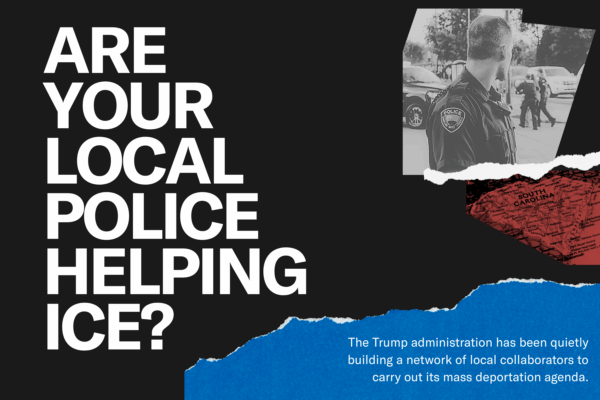Regardless of your immigration status, you have guaranteed rights under the United States Constitution. Learn more here about your rights as an immigrant and how to express them.
For more information, see the ACLU Immigrants’ Rights page.
Select a Scenario
Find an Immigration Attorney
Many South Carolinians reach out to us because they are looking for legal help. We are not able to accept or respond to requests for legal assistance, and we do not provide immigration legal services. But there are resources for people who need help.
You can find an immigration attorney near you who speaks your language using the American Immigration Lawyers Association website.
Charleston Legal Access offers some legal services to immigrants statewide at a lower cost. To see if you qualify for services, visit their website:
The South Carolina Access to Justice Commission provides a tool, the Legal Resource Finder, that helps identify legal aid organizations and self-help resources available to you.
For more information, see our Find Legal Help page.
Support Our Immigrant Neighbors Training
Many South Carolinians want to support their immigrant neighbors. If you are an educator, healthcare provider, member of a faith community, or part of another organization interested in protecting immigrants’ rights — we can help. We provide in-person and virtual training to help you support immigrants who may be fearful about increased immigration enforcement.
To request a Support Our Immigrant Neighbors Training, use our Request a Speaker form:
Know Your Rights Training
Misinformation and harmful political rhetoric are creating fear and uncertainty, and immigrants across the state are unsure about their rights under this new administration.
That’s why we’ve developed a Know Your Rights Training for immigrants living in South Carolina. We can come to you or host virtual training sessions. To request a Know Your Rights Training, use our Request a Speaker form:
Immigration Enforcement at Schools
On January 21, 2025, President Trump rescinded a long-standing policy that discouraged immigration enforcement actions in “sensitive areas,” including schools. As a result, schools in South Carolina may begin receiving visits and inquiries from Immigration and Customs Enforcement (ICE) agents looking to deport students and their families. But federal and state law guarantees all South Carolina children access to a free public education and protects their private information from being shared with law enforcement.
In February 2025, the American Civil Liberties Union of South Carolina sent a letter to school district superintendents and general counsel across South Carolina about immigration enforcement in schools. We informed them of the rights of all children in South Carolina to receive a free K-12 public education, and we urged districts to adopt policies that limit ICE access to school property. You can read the letter here and share it with your administrators:
If you would like to organize a training session for educators seeking to protect the rights of immigrant students and their families, use the Request a Speaker form.
Judicial Warrants vs. Administrative Warrants: Know the Difference
If ICE knocks on your front door, don’t open it. Ask to see a warrant.
Agents may show you a judicial warrant issued by a court. Or they might have an administrative warrant from the U.S. Department of Homeland Security.
There’s a critical difference between the two. To see examples of judicial and administrative warrants, see our page Immigration Enforcement: Administrative vs. Judicial Warrants.
To enter and search your house or non-public areas of a business—like a restaurant kitchen—ICE needs a valid judicial warrant issued by a court and signed by a judge.
Here’s what to look for:
- At the top, it says Superior Court of California or U.S. District Court.
- Make sure the address is correct, and the person named on the warrant lives at the home.
- Check the date and signature.
An administrative arrest warrant or a warrant of removal says U.S. Department of Homeland Security. An administrative warrant does not grant ICE permission to enter or search your house.
If ICE agents show you an administrative warrant, you don’t have to let them in. If they force their way in, say you don’t consent, but don’t try to stop them.
And don’t answer any questions. Remember, in any encounter with ICE or other federal immigration officers, you always have the right to remain silent.
What Do I Do if Law Enforcement Asks About My Immigration Status?
How to reduce risk to yourself:
- Stay calm. Don’t run, argue, resist, or obstruct the officer, even if you believe your rights are being violated. Keep your hands where police can see them.
- Don’t lie about your status or provide false documents.
Your rights:
- You have the right to remain silent and do not have to discuss your immigration or citizenship status with police, immigration agents, or other officials. Anything you tell an officer can later be used against you in immigration court.
- If you are not a U.S. citizen and an immigration agent requests your immigration papers, you must show them if you have them with you.
- If an immigration agent asks if they can search you, you have the right to say no. Agents do not have the right to search you or your belongings without your consent or probable cause.
- If you’re over 18, carry your papers with you at all times. If you don’t have them, tell the officer that you want to remain silent, or that you want to consult a lawyer before answering any questions.
What to do in such an encounter:
- If you are driving and are pulled over, the officer can require you to show your license, vehicle registration and proof of insurance, but you don’t have to answer questions about your immigration status.
- Customs officers can ask about your immigration status when entering or leaving the country. If you are a lawful permanent resident (LPR) who has maintained your status, you only have to answer questions establishing your identity and permanent residency. Refusal to answer other questions will likely cause delay, but officials may not deny you entry into the United States for failure to answer other questions. If you are a non-citizen visa holder, you may be denied entry into the U.S. if you refuse to answer officers’ questions.
For more information, see the ACLU Immigrants’ Rights page.
What Do I Do if I Have Been Stopped by Police or ICE?
How to reduce risk to yourself:
- Stay calm and do not resist or obstruct the agents or officers.
- Do not lie or give false documents.
- Prepare yourself and your family in case you are arrested. Memorize the phone numbers of your family and your lawyer. Make emergency plans if you have children or take medication.
Your rights:
- You have the right to remain silent. If you wish to exercise that right, say so out loud. (In some states, you may be required to provide your name if asked to identify yourself.)
- You do not have to consent to a search of yourself or your belongings, but police may pat down your clothing if they suspect a weapon.
- If you are arrested by police, you have the right to a government-appointed lawyer.
- If you are detained by ICE, you have the right to consult with a lawyer, but the government is not required to provide one for you. You can ask for a list of free or low-cost alternatives.
- You do not have to answer questions about where you were born, whether you are a U.S. citizen, or how you entered the country. (Separate rules apply at international borders and airports, and for individuals on certain nonimmigrant visas, including tourists and business travelers.)
What to do if you are arrested or detained:
- Say you wish to remain silent and ask for a lawyer immediately. Don't give any explanations or excuses. Don't say anything, sign anything, or make any decisions without a lawyer.
- If you have been arrested by police, you have the right to make a local phone call. The police cannot listen if you call a lawyer.
- If you have been detained by ICE, you have the right to contact your consulate or have an officer inform the consulate of your detention.
- Remember your immigration number ("A" number) and give it to your family. It will help family members locate you.
- Keep a copy of your immigration documents with someone you trust.
- If you are a non-citizen: Ask your lawyer about the effect of a criminal conviction or plea on your immigration status. Don't discuss your immigration status with anyone but your lawyer. While you are in jail, an immigration agent may visit you. Do not answer questions or sign anything before talking to a lawyer. Read all papers fully. If you do not understand or cannot read the papers, tell the officer you need an interpreter.
If you believe your rights were violated:
- Write down everything you remember, including officers’ badges and patrol car numbers, which agency the officers were from, and any other details. Get contact information for witnesses.
- If you’re injured, seek medical attention immediately and take photographs of your injuries.
- File a written complaint with the agency’s internal affairs division or civilian complaint board. In most cases, you can file a complaint anonymously if you wish.
For more information, see the ACLU Immigrants’ Rights page.
What Do I Do if Police or ICE Are at My Home?
How to reduce risk to yourself:
- Stay calm and keep the door closed. Opening the door does not give them permission to come inside, but it is safer to speak to ICE through the door.
Your rights:
- You have the right to remain silent, even if an officer has a warrant.
- You do not have to let police or immigration agents into your home unless they have certain kinds of warrants.
- If police have an arrest warrant, they are legally allowed to enter the home of the person on the warrant if they believe that person is inside. But a warrant of removal/deportation (Form I-205) does not allow officers to enter a home without consent.
What to do when the police or ICE arrive:
- Ask if they are immigration agents and what they are there for.
- Ask the agent or officer to show you a badge or identification through the window or peephole.
- Ask if they have a warrant signed by a judge. If they say they do, ask them to slide it under the door or hold it up to a window so you can inspect it.
- Don’t lie or produce any false documents. Don’t sign anything without speaking with a lawyer first.
- Do not open your door unless ICE shows you a judicial search or arrest warrant naming a person in your residence and/or areas to be searched at your address. If they don’t produce a warrant, keep the door closed. State: “I do not consent to your entry.”
- If agents force their way in, do not resist. If you wish to exercise your rights, state: “I do not consent to your entry or to your search of these premises. I am exercising my right to remain silent. I wish to speak with a lawyer as soon as possible.”
- If you are on probation with a search condition, law enforcement is allowed to enter your home.
For more information, see the ACLU Immigrants’ Rights page.
Share Your Story: Immigration Raid
The ACLU of South Carolina does not provide immigration legal services and cannot represent you in your immigration case.*
However, if you experienced an immigration raid, we would like to hear your story. Hearing community members’ stories helps us understand how rights are being violated as part of immigration enforcement efforts. This information will guide our advocacy efforts and will help our investigation into whether or not there are potential legal responses available. Unfortunately, we do not have the capacity to contact each person who submits a form, but we appreciate your time and will review each submission.
Share Your Story: Immigration Raid
When you submit this form, it will not automatically collect your details like name and email address unless you provide it yourself.
*We suggest reaching out to Charleston Legal Access for help or using the AILA (American Immigration Lawyer’s Association) website to find an immigration lawyer near you.
What is a 287(g) Agreement?
287(g) agreements authorize local police to do the work of Immigration and Customs Enforcement (ICE). They are a threat to public safety, a disaster for civil liberties, and a financial burden on local governments. Learn more at aclusc.org/287g
Additional Resources
- Know Your Rights: Immigrants’ Rights (ACLU)
- We Have Rights: Multilingual Videos on What to Do When Interacting with ICE (ACLU)
- Know Your Rights (National Immigration Law Center)
- A Toolkit for Organizations Responding to Mass Worksite Immigration Raids (NILC)
- Spanish-Language News and Know Your Rights Materials in South Carolina (Nuestro Estado)
- Order or Print Know Your Rights Cards (Immigrant Legal Resource Center)
Related Content

Are your local police collaborating with ICE?

Sheriff’s election coming up? Get the candidates’ stances on ICE collaboration

Episode 15: ICE Invades South Carolina (Part 1)
Stay Informed
Sign up to be the first to hear about how to take action.
By completing this form, I agree to receive occasional emails per the terms of the ACLU’s privacy statement.
By completing this form, I agree to receive occasional emails per the terms of the ACLU’s privacy statement.


